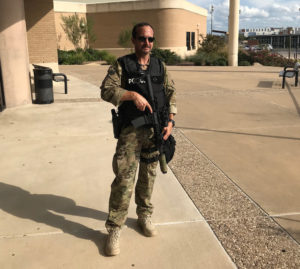Journalist, Tattoo Shop Owner, and Sheriff: Three Physicians Who Came to Emergency Medicine As a Second Career

There is a certain stereotype of the fresh-faced, brand new attending: young, ambitious, their heads filled to the brim with medical education. These attendings first come to their post-residency clinical practice with plenty of intense educational experience – and often little life experience.
These are not those.
Dr. T.J. Milling, currently an attending at Dell Seton Medical Center in Austin, Texas, had a previous, decade-long career as a journalist for the Houston Chronicle. He covered a crack epidemic that led to more than 700 homicides in one year in Houston, the military coup that deposed Haitian president Jean-Bertrand Aristide, the Oklahoma City bombing, and 9/11. Dr. Ian Strand, who just graduated residency from Ohio State, attended West Point and did several tours in Iraq as an Army Ranger before leaving the military to start a tattoo shop business with his brother in Portland. Dr. Paul Goen, currently Medical Director for USACS Southwest, worked previously as a deputy sheriff in Louisiana. He worked with narcotics detectives and once stared down a full-fledged prison riot by telling the prisoners they could either get into bed or he’d put them to bed.
Needless to say, they did not arrive at medical school all fresh-faced and doe-eyed. Many, like them, arrived at emergency medicine as a vocation only after other careers. Though medicine was new to them when they did, they brought life experiences that continue to overlap or support their clinical work. Many, like Strand, came via the military, though few have the entrepreneurial experience Strand gained by starting and running his own business. Strand chose to join a small, independent group, he said, in part as a reaction against the large bureaucratic infrastructure he experienced in the military, and perhaps because it was the closest environment he could find to the small business he ran with his brother.
Goen, meanwhile, said his experience in law enforcement bears a lot of similarity to his experience in emergency medicine: “Ninety, ninety-five percent of the same old, five percent sheer adrenaline.” His experience facing down the prison riot, he said, was an example of how he learned to think on his feet under duress, a skill he was able to bring along with him to his medical career, rather than develop on the job.
Milling, for his part, has become an accomplished researcher and an editor at Annals of Emergency Medicine in addition to practicing clinically. He leveraged his journalism experience to start Annals’ “News & Perspective” section, and today manages teams of freelancers and former newspaper reporters for the journal.
Reporting from Houston
Milling started working at the Houston Chronicle in 1991 after he got out of the Air Force. He said he had joined the military to pay for College, and he arrived at the Chronicle with a BA in Journalism from the University of Houston. He started out covering crime, moved to courts, covered City Hall, went to general assignment, and eventually became an editor.
“I had done all the beats,” Milling said. “I was getting a little bored with it.”
Still, he had never considered a medical career. His only substantial contact with clinicians had been covering the coup in Haiti, when he came across doctors working with Médecins Sans Frontières, the international relief organization. “I considered all the professions. Being a bit naive, I thought, ‘which one would be the biggest challenge?'” Milling said.
He kept working as a freelance journalist while he attended Baylor College of Medicine, occasionally doing pieces for the Chronicle on the weekends. He had just done an externship at Bellevue Hospital in New York when 9/11 happened. The Chronicle was trying to figure out how to get reporters into New York, and Milling thought his student ID card from Bellevue would be the ticket. Since all plane travel was grounded, he and two other reporters drove a rented minivan from Houston to Washington DC, where they got on a train to Penn Station in New York.
He and the Chronicle reporters set up shop in a Times Square hotel and did their reporting on the aftermath. During that time, Milling also met his wife, then a writer for Marie Claire. He attended residency at New York Methodist before returning to Austin, where his wife had attended University of Texas, to work for ESP, a USACS founding partner.
Aging Quick
Paul Goen grew up around law enforcement. His father was a police officer for 45 years, so he grew up around it, and Goen said it was a natural choice of career. His first day on the job in Louisiana was at the maximum-security prison where he and a handful of other inmates eventually dealt with the riot.
“I think a lot of times, emergency docs can get a sixth sense of ‘bs’ when they see it,” Goen said. “And I think I was attuned to that a little sooner than most because of my experience in law enforcement.”
He spent only two years with the sheriff’s department before deciding he wanted to make a change. He attended medical school at University of Texas Health Science Center in San Antonio and did residency at Scott & White Memorial Hospital about an hour north of Austin.
“I was actually full time working with the sheriff’s office and a full-time student,” Goen recalled. “I would work 6pm to 6am, go shower, go to class from 8am to 11 or noon and go home to get some sleep and do it again. That’ll age you real quick.”
More than ten years after becoming a physician, though, his law enforcement background is still with him. Goen is a commissioned Peace Officer, a kind of reserve officer, with one of the county constables, and is the Medical Director for on the local SWAT teams. He does community service with local law enforcement when it works with his schedule. In 2017, he volunteered to help provide policing and security at the Presidential Inauguration in Washington DC.
“I still get to dabble in law enforcement,” said Goen, who has been married for twenty years and has three kids. His wife is a little hesitant about “the whole law enforcement aspect,” he said. “I told her, we train every Wednesday with SWAT. Most guys Wednesday mornings will spend four hours playing golf. I just spent four hours with some guys shooting cool guns.”
Goen said that explanation seems to have appeased her, at least for now.
Entrepreneurial Pursuits
Ian Strand had always thought he would spend his career in the military. After attending the US Military Academy and West Point, he was commissioned as an officer and sent to Iraq. An infantry officer, he commanded “guys who rode around in trucks flew around in helicopters.” He never – not once – considered a future in medicine.
But the Iraq War eventually changed the view Strand had of his future. The defining moment came in a mess hall. He said he looked around and saw more military contractors there than actual soldiers in the military. For some reason, this was the moment that crystalized his desire to get out. He felt like a “cog in a machine,” he said. “That was a turning point where I said, this isn’t for me.”
“I’d always thought I’d be in the military for 30 years. So, there was a little bit of a crisis in faith,” Strand said.
When he got home from his five-year obligation, he bounced from idea to idea, floating around not really sure which direction to head. When his brother approached him about opening up a tattoo shop together, he jumped at it. “We ended up running it kind of like a hair salon,” he said. They did the buildout, rented out seats to local tattoo artists, and handled all the up-front marketing and back-end administrative work.
Strand said he enjoyed the work because it was his, and it wasn’t part of corporate America or any big bureaucratic system. “I thought maybe I could stay there and turn it into a full-time career,” he said. “But being a small business owner and hiring people and firing people and paying bills and taxes and having a variable income, and never being off were things I decided were just a little too risky for a long-term endeavor for me personally.”
He thought about going to law school, and actually applied to be a police offer, but didn’t get admitted to the police academy. He did, however, get in to medical school, having taken some time to refresh organic chemistry and biology after not having been in school for so long. Strand attended Pacific Northwest University Medical School before doing residency at Ohio University College of Medicine, which is affiliated with USACS-staffed Doctors Hospital in Columbus.
He graduated last year, moving back home to Washington State and joining a small independent group there.
Lessons from Life
Strand, like Milling and Goen, has taken several lessons from his previous career into his current one. Strand’s entrepreneurial background, for example, means he has few illusions about how the evolving business of emergency medicine could impact working for a small, independent group. The group is very stable, he said, but Strand said he understands there may nevertheless be an end date for how long smaller partnerships like that remain viable.
Meanwhile, Goen’s law enforcement experience continues to have relevance in dealing with patients and operating smoothly under pressure in the ER, while Milling’s journalism background has benefited his work at Annals, as well as the marketing and communications materials for the hospitals he has worked at.
The life lessons these physicians acquired in previous lives benefit not just their career, but their patients. Milling, for example, recalled the incredible diversity of people he’d interviewed at the newspaper, including everyone from murder victims’ families to governors to despots. “It makes you comfortable talking to just about anybody… You need to get their side of the story and put it together and understand it.”
That skill and all the others gleaned from previous careers are valuable assets to be taking forward as the job of an emergency physician continues to evolve, roles continue to expand, and challenges continue to test.

